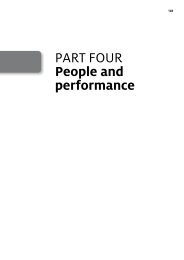The growing business handbook : inspiration and advice ... - Sparkler
The growing business handbook : inspiration and advice ... - Sparkler
The growing business handbook : inspiration and advice ... - Sparkler
You also want an ePaper? Increase the reach of your titles
YUMPU automatically turns print PDFs into web optimized ePapers that Google loves.
Transforming the finance function<br />
261<br />
Techniques for improvement<br />
To achieve improving <strong>business</strong> support through <strong>business</strong> partnering activities, you do<br />
not need to disperse finance professionals throughout the <strong>business</strong>, nor do those<br />
professionals need to spend a large part of their time outside the finance department.<br />
Instead, the cross-functional collaboration that is essential in supporting the <strong>business</strong><br />
can also be achieved through virtual communication <strong>and</strong> cross-functional projects<br />
<strong>and</strong> initiatives, which allow finance personnel to interact across departmental <strong>and</strong><br />
geographic boundaries. Attachment of finance professionals to the finance function,<br />
regardless of where they physically sit, is now the predominant model <strong>and</strong> this does<br />
not inhibit collaboration. Even where finance professionals are part of the finance<br />
function, around half see their duties as supporting or most directly related to other<br />
parts of the organization.<br />
Objectivity <strong>and</strong> tradition?<br />
Limiting the degree of finance professionals’ involvement <strong>and</strong> integration with the<br />
<strong>business</strong> may set a limit on the extent of <strong>business</strong> partnering activity, but there may be<br />
benefits, which appear to carry significant weight. Notably, having finance<br />
professionals accountable to the finance function helps to maintain their independence<br />
<strong>and</strong> objectivity – a quality often valued as much by non-finance personnel as those<br />
within the function. Limits on integration may also derive from some resistance to<br />
becoming more <strong>business</strong>-facing by individual finance professionals who are more<br />
comfortable within more traditional finance roles.<br />
Integrity, independence <strong>and</strong> objectivity are not negotiable for the finance<br />
professional <strong>and</strong> are the cornerstone of all finance roles. However, the <strong>business</strong><br />
partnering role puts these values under stress, which is why such roles require<br />
maturity, strength of character <strong>and</strong> skill in dealing with <strong>business</strong> partners.<br />
Dominic P Moorhead, President, European Operations of Caris Life Sciences <strong>and</strong> ex CFO Hoffman LaRoche<br />
So, consultant or <strong>business</strong> partner?<br />
Although strategic/advisory activities <strong>and</strong> the <strong>business</strong> skills that support them largely<br />
define the <strong>business</strong> partner role, many more finance professionals see themselves as<br />
providing <strong>business</strong> <strong>advice</strong> acting as an internal consultant, rather than undertaking<br />
<strong>business</strong> partnering as such. <strong>The</strong> distinction between advisor <strong>and</strong> partner may lie in<br />
whether the finance professional takes a stake in or is jointly responsible for the<br />
operational <strong>and</strong> strategic decisions with which they are involved. Doing so represents<br />
a somewhat radical move away from the traditional role of the finance professional<br />
for all but those at the most senior level.








